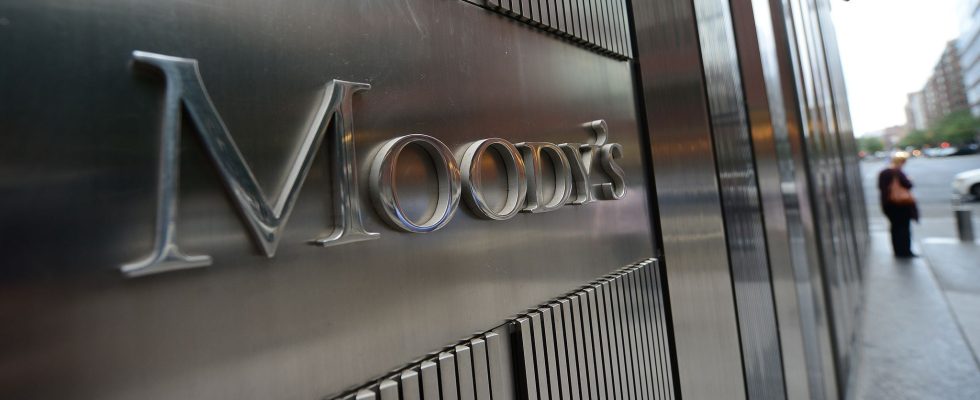How much longer will they close their eyes? Economists are sounding the alarm, the executive is gesticulating to plug the gaps, the newspapers are making headlines… The markets seem strangely indifferent to the slippage of French public finances. And the decisions of the rating agencies, monitored like milk on fire by the political-media world, have so far changed nothing.
While Moody’s and Fitch have kept their opinions on French debt unchanged, eyes will now turn to S&P, which will deliver its verdict on May 31. Especially since the most influential of the three American arbitrators has already upgraded France’s rating to a negative outlook at the end of 2022. But even if a downgrade occurs, from AA to AA-, it is a safe bet that investors would maintain their composure .
No impact on the rate spread
To judge their disposition towards French debt, we look at the spread between the OAT and the Bund. In plain French, the gap between the ten-year interest rate on French sovereign bonds compared to those of the German state. However, as Aymeric Poizot, head of the Fitch agency, explained to L’Express, “for two years, in Europe, the cost of debt has been absolutely not influenced by the ratings but entirely by the monetary policy of the European Central Bank. Besides, remember, when France’s rating was downgraded last year, the spread compared to Germany did not change.” In April 2023, Fitch lowered the French sovereign rating from AA to AA-.
From there to say that the government has complete freedom to maintain a deleterious trajectory, surely not. For several weeks, we have had to swallow a few snakes, starting with the revelation of a public deficit of 5.5% in 2023, much higher than expectations. For 2024, Bercy is expecting a rate of 5.1%, which is not encouraging. The projections for the following years, up to 2.9% in 2027, appear to fall under the Coué method. As for public debt, it is expected to increase further until 2024, before a very modest decline, to land at 112% in 2027, compared to 110.6% in 2023. The IMF is more pessimistic, counting on 114%. in three years.
Stabilize the debt to be credible
These are not the only question marks. “The government’s new stability program has limited credibility and contains inconsistencies,” underlines Eric Dor in an article for the Swiss site Allnews. The director of economic studies at the IESEG School of Management points out in particular the objective of reducing the primary deficit – that is to say excluding debt charges – which seems out of reach. “Public spending this year has already been reduced by 10 billion euros by a decree canceling credits in February. Next year, the government is counting on an additional reduction of 25 to 30 billion euros. realize.” Eric Dor drives the point home: “It is generally recognized that to maintain the confidence of financial markets, a government must ensure at least credible prospects of stabilizing public debt as a percentage of nominal GDP.”
So, how far can France allow itself to drift? Beware of the backlash, warns Olivier Klein, professor of financial macroeconomics at HEC and general manager of Lazard Frères Banque. “Financial markets do not react gradually to economic deteriorations or those of public debt. They may not worry about them, focused on other events. And then suddenly, suddenly and simultaneously, the sanction may fall.” And remember that before 2010, the year of the explosion of the sovereign debt crisis, rate differences between European countries had never been so low. All it took was a spark from Greece to change the situation throughout the euro zone.
French “paper” prized by the Japanese
For the moment, the agencies still seem very lenient towards an undeserving French student. Some European countries, which are more virtuous, are given lower marks. But France has particularly liquid debt, very popular with investors looking for risk-free assets to diversify their portfolio. The safest remains, of course, that issued across the Rhine. But Germany has the disadvantage of its virtue: this lower debt requires few issues of new securities, around four times less than Paris this year. International buyers of sovereign debt in the euro zone are therefore turning to the large economy that is close to it, France. “The Japanese in particular have a real appetite for this debt, starting with the retirement fund and Japan Post Bank,” specifies Christopher Dembik, economic advisor to the management company Pictet AM.
“Our country has a solid economy, with companies that are world flagships, with a few strong sectors, political and institutional stability, and a euro which protects it, recognizes Olivier Klein. But we cannot be satisfied with the situation This long-term drift will lead to a break, which may occur with an event which will not necessarily be very significant, but which will reverse market sentiment.
According to Robert Ophèle, there is no danger yet in the house. However, the senior official, who worked at the Financial Markets Authority and the Bank of France, warns: “If French debt becomes simple A, some investors will look at the paper differently.” Reduction in operating expenses, increase in revenue through increased taxes, everyone has their own opinion on the method to adopt to avoid the worst. “But we also need to work on the denominator, namely GDP,” insists Olivier Klein. An acceleration in economic growth driven by investment is a trend that agencies would welcome.
.
